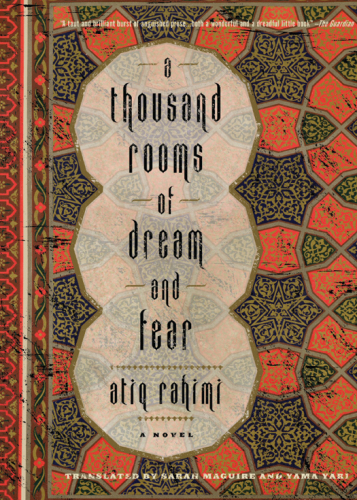
A Thousand Rooms of Dream and Fear
A Novel
- اطلاعات
- نقد و بررسی
- دیدگاه کاربران
نقد و بررسی

November 29, 2010
Rahimi (The Patience Stone) overcomes a stuttering start to deliver an original and utterly personal account of the pressures a totalitarian society exerts on the individual in 1979 Afghanistan, before the Soviet invasion. After soldiers brutally beat Farhad, a sensitive 21-year-old student, he begins to grasp the less obvious but equally horrific abuse of Afghan women by the patriarchal, Islamo-fascist order. When Mahnaz, a grieving widow, rescues Farhad from the Kabul gutter where he lies bleeding and unconscious, he must come to grips with his own father's ignominious behavior and with the drastic plight of women like Mahnaz. In a particularly imaginative twist, Farhad becomes obsessed with the elaborate carpets that are such a part of daily life, realizing eventually that these beautiful household objects are merely metaphors for the ongoing tragedy that is the existence of the women who made them. A flawless translation does justice to Rahimi's taut, highly calibrated prose.

Starred review from January 1, 2011
Fiction can express pain and suffering as little else can, as in this slim novel set in Afghanistan in October 1979, a time between coups and the Soviet invasion. Narrator Farhad, a 21-year-old university student in Kabul, goes out drinking with a friend, forgets the curfew and password, and is apprehended by jackbooted soldiers who beat and kick him, leaving him unconscious in a sewer. Mahnaz, the widowed mother of a young son (her husband was jailed as a political prisoner and executed), takes him into her home. What might seem a simple, compassionate act is not only brave, exposing Mahnaz to danger when the returning soldiers search for the student, but also prohibited by the Muslim culture. Farhad, hallucinating and between life and death, stays for days with a woman without a husband and sees not only her hair but also her breast, as she offers her milk to her brother, a young man traumatized by repeated military torture. In prose that is spare and incisive, poetic and searing, prizewinning Afghani author Rahimi, who fled his native land in 1984, captures the distress of his people.(Reprinted with permission of Booklist, copyright 2011, American Library Association.)




دیدگاه کاربران